Class 9 English Chapter 2.5 Question Answer Maharashtra Board
Balbharti Maharashtra State Board Class 9 English Solutions My English Coursebook Chapter 2.5 A Play Notes, Textbook Exercise Important Questions and Answers.
A Play Poem 9th Std Question Answer
My English Coursebook Std 9 Digest Chapter 2.5 A Play Textbook Questions and Answers
Warming up!
Chit-chat:
- Do you like to watch plays?
- Which is the last play you saw?
- Do you watch TV serials? Which ones?
- Do you like slow-moving serials?
- Do you like stories from the past?
- What type of stories do you like?

Two Truths, One Lie
Make groups of 10-15. In this game, each person writes three sentences about himself/herself, two of which are true and the third one is a lie. Read aloud your sentences, while others guess which two are true and which is a lie.
Examples: Hello, everyone! I am Sonali. I have a brother and a sister. I live in Amalner. We have a pet dog at home.
Question 1.
Make groups of 10-15. In this game, each person writes three sentences about himself/herself, two of which are true and the third one is a lie. Read aloud your sentences, while others guess which two are true and which is a lie.
Examples: Hello, everyone! I am Sonali. I have a brother and a sister. I live in Amalner. We have a pet dog at home.
Answer:
1. Hello everyone!
I am Sahil.
I live in Pune at Shivaj inagar.
I am one of the most studious students of our class.
I visited Sri Lanka last month with my parents.
2. Hello everyone!
I am Ruta.
I am Bharat Natyam dancer.
I have won many dance competitions.
But I want to be a classical singer.

Lost and Found
Question 1.
Divide the students into groups of five. They sit in a circle. They choose one object of daily use such as a bag, wallet, box, etc. The group leader writes four sentences about it.
Answer:
I have found a
water bottle
.
It’s
pink
.
It’s
cylindrical in shape
.
It’s
transparent
.
It has a
steel cap
.
I found it
in our school library
.
Others, too, write four sentences each.
- I have lost a tiffin box .
- It’s colour is pink .
- It’s square in shape .
- I lost it in our school canteen .
They all open and read their lines, beginning with the group leader. The player whose description matches the group leader’s the most gets the object.
Part I
1. List the characters that have appeared so far in the play.
Question 1.
List the characters that have appeared so far in the play.
Answer:
Fourth Guard Messenger, Thief, Thiefs friend, King, Merchant, Bricklayer, Mortar-maker.

2. List all the different titles they use to address the King.
Question 1.
List all the different titles they use to address the King.
Answer:
First Guard, Second Guard, Disciple, King Chaupat.
3. Copy the exclamations from the play. (At least 5)
Question 1.
Copy the exclamations from the play. (At least 5)
Answer:
1. How boring!
2. Oh, Most Great King!
(Students can copy such examples from the play on their own.)
4. Copy the orders (imperative sentences) from the play.
Question 1.
Copy the orders (imperative sentences) from the play.
Answer:
- Spare my daughter.
- Bring the money-lender’s daughter.
- Summon the mortar-maker at once.
- Show mercy to this humble potter.

5. Use your imagination and the details from the play and draw a map of Andher Nagari.
Question 1.
Use your imagination and the details from the play and draw a map of Andher Nagari.
Answer:
(Students can draw the map using their imagination.)
6. Write what each of the following should have said after listening to the complaint against him/her:
Question 1.
Write what each of the following should have said after listening to the complaint against him/her:
(a) Daughter …………………
(b) Potter …………………….
(c) Mortar-maker …………………
(d) Bricklayer ………………..
(e) Merchant ………………………….
Answer:
(a) Daughter: Daughter should have said that, she was going to get married next week, so she should be excused from being punished.
(b) Potter: I never make defective pots. Mortar- maker might have brought it from somewhere else.
(c) Mortar-maker: I always use a bottle-necked pot to pour water, it is the bricklayer’s idea to blame me.
(d) Bricklayer: Extremely sorry to say, My Lord. I have never worked carelessly in my entire life. I am faithful to my profession.
(e) Merchant: If I had been the merchant, I would have asked the king to punish the thieves as they were trying to break in my house when my whole family was not there at home and it is a crime. So they should be punished.

7. What should the king have said to the thief ?
Question 1.
What should the king have said to the thief ?
Answer:
The king should have said to the thief that it was the fault of him and his friend and not of the merchant. As they had entered his house with the intention of stealing when his family was away. So he and his friend were totally responsible for what had happened.
8. Will a thief appear in a court on his own? Why does this Thief dare to do so?
Question 1.
Will a thief appear in a court on his own? Why does this Thief dare to do so?
Answer:
A thief will never appear in a court on his own. This thief dares to do so because the king of his kingdom was not powerful and the rules and regulations of his kingdom were not so strict.

Language study:
9. Read the following sentences and find the subject and the verb in each.
Question 1.
Read the following sentences and find the subject and the verb in each.
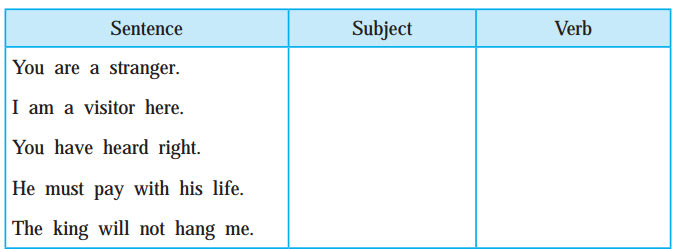
Answer:
| Sentence | Subject | verb |
| 1. You are a stranger. | You | are |
| 2. I am a visitor here. | I | am |
| 3. You have heard right. | You | have |
| heard | ||
| 4. The king will not hang me. | The king | will |
| hang | ||
| 5. He must pay with his life | He | must |
| pay |

10. Read the following sentences. Tick the ones in passive voice. Copy them correctly.
Question 1.
Read the following sentences. Tick the ones in passive voice. Copy them correctly.
- I have heard amazing stories [ ]
- I am especially impressed by the fact [ ]
- I am quite happy about it. [ ]
- I beg for justice. [ ]
- ……. and my friend was instantly killed [ ]
- My house has been recently built [ ]
- It is the fault of the bricklayer [ ]
Answer:
- I have heard amazing stories …. [ ]
- I am especially impressed by the fact…. [✓]
- I am quite happy about it. [ ]
- I beg for justice. [ ]
- … and my friend was instantly killed ….. [✓]
- My house has been recently built …. [✓]
- It is the fault of the bricklayer …. [ ]
Part II
1. List the characters that appear for the first time in this part of the play. Write one or two lines about each of them.
Question 1.
List the characters that appear for the first time in this part of the play. Write one or two lines about each of them.
Answer:
- Goldsmith: He was dutiful and tried to follow the king’s order by setting aside all his work.
- Hangman: He was also faithful towards his duties. He tried to follow the King’s order. He was an executioner who hangs the culprits.
- Sage: A wise man from a neighbouring forest who smartly saved his disciple from the J punishment given by King Choupat.

2. Say whether the following sentences are true or false:
Question 1.
Say whether the following sentences are true or false:
(a) The Goldsmith blamed the King for the delay in his work.
(b) The King thought that the Goldsmith had a good reason to delay the Daughter’s work.
(c) The Goldsmith was hanged.
(d) The noose did not fit the Goldsmith’s neck.
(e) The noose did not fit the disciple’s neck.
(f) The Sage wanted to die on that day.
(g) The Sage wanted to save his Disciple.
(h) The King wanted to be King again in his next birth.
Answer:
(a) The Goldsmith blamed the King for the delay in his work. –
True
(b) The King thought that the Goldsmith had a good reason to delay the Daughter’s work. –
False
(c) The Goldsmith was hanged. –
False
(d) The noose did not fit the Goldsmith’s neck. –
True
(e) The noose did not fit the disciple’s neck. –
False
(f) The sage wanted to die on that day. –
True
(g) The sage wanted to save his disciple. –
True
(h) The king wanted to be king again in his next birth. –
True

3. Write any three instances of funny rules and twisted logic used in Andher Nagari.
Question 1.
Write any three instances of funny rules and twisted logic used in Andher Nagri.
Answer:
Example:
- The disciple came to Andher Nagari to pay respects to the mighty King Choupat but to his surprise the king ordered the Hangman to hang him without delay.
- The blame game continued one after another and the king ordered the Hangman everytime to hang the person without verifying his/her mistake.
- The king requested the guards to take him to the gallows and hang him without any delay to become the next king of the same kingdom in his next life.
4. List the proverbs and sayings used in the play.
Question 1.
List the proverbs and sayings used in the play.
Answer:
1. Justice delayed is justice denied.
2. Our actions speak louder than words.

5. Read the entire play and complete the following blame game flow chart.
Question 1.
Read the entire play and complete the following blame game flow chart.
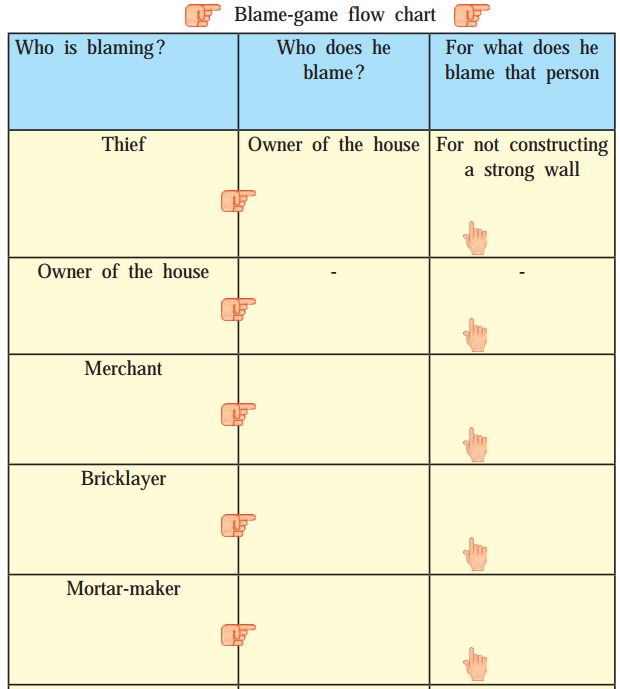
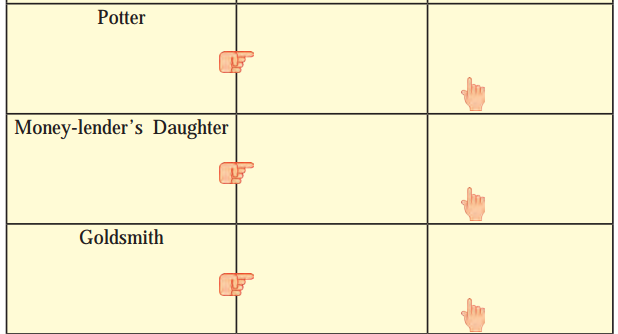
Answer:
| Who is blaming? | Who does he blame? | For what does he blame that person? |
| Thief | Owner of the house | For not constructing a strong wall. |
| Owner of the house (Merchant) | Bricklayer | For carelessly building a weak wall. |
| Bricklayer | Mortar- maker | For mixing too much water in Mortar. |
| Mortar-maker | Potter | For making a defective pot with a large mouth. |
| Potter | Money lender’s Daughter | For disturbing him with tinkling of anklets. |
| Money-lender’s Daughter | Goldsmith | For delay in the delivery of her ornaments. |
| Goldsmith | King | For giving orders to set aside all other work to make the Queen’s ornaments. |
6. Form groups. Translate one page of the play into your mother tongue as a group activity. Gather the pages translated by different groups and prepare a translated script of the entire play.
Question 1.
Form groups. Translate one page of the play into your mother tongue as a group activity. Gather the pages translated by different groups and prepare a translated script of the entire play.

Langauge Study:
7. Divide the play (Part I as well as Part II) into sections.
Form groups and assign roles. Practise your lines in groups.
Hold play reading sessions in the classroom.
Which group/student presents the most effective reading?
Note the features that make an oral presentation effective. Some of them are :
-
Meaningful reading – taking proper pauses
(breaking the speech into meaningful chunks) - Using suitable intonation
- Speaking clearly
- Good pronunciation – using English sounds and stress patterns
- Pleasant and confident appearance of the speakers.
8. Look up the following entries in the Language Study pages given at the end.
- stress
- intonation
- sound
- consonant
- vowel
Question 1.
Look up the following entries in the Language Study pages given at the end.
- stress
- intonation
- sound
- consonant
- vowel

9. Note the way the dialogue in the play is presented. Look up the word ‘colon’ in the ‘Language Study’ pages and note how ills used in the play.
Question 1.
Note the way the dialogue in the play is presented. Look up the word ‘colon’ in the ‘Language Study’ pages and note how ills used in the play.
10. Listen carefully and write the verbs in the appropriate column.
Question 1.
Listen carefully and write the verbs in the appropriate column.
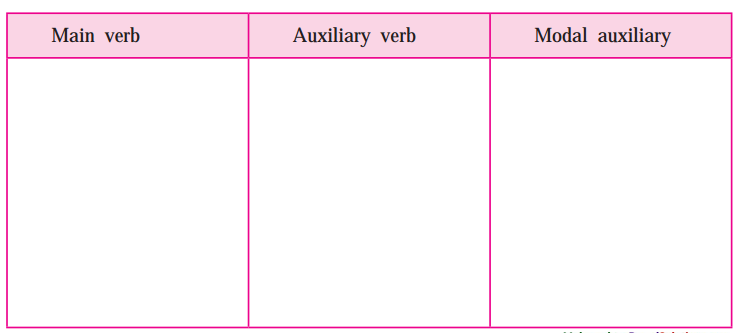
Teacher: can, give, following, commanded, get, has, been, spare, does, take, hand, have, fall, forgive, let, drag, return, will, is, try, has, must, be, resist, force, speak, are, were, should, had, thought, lost, would, says, was, are, does, may, cannot, demand, shall, shouldn’t, become, reign
Answer:
| Main verb | Auxiliary verb | Model auxiliary |
| give, following, commanded, spare, take, hand, fall, have, forgive, drag, get, does, return, try, resist, become, force, speak, demand, reign, says, thought, lost | has, been, let, is, be, are, were, had, was, does | can, will, must, should, would, may, cannot, shall, shouldn’t |

My English Coursebook 9th Class Solutions Chapter 2.5 A Play Additional Important Questions and Answers
Read the following passage and do the activities:
Simple Factual Activities:
Question 1.
Name the following:
Answer:
- Name of the kingdom – Andher Nagari
- Name of the king – Chaupat
- The person who was not – Second guard alert
- The forest from where a – Ghangor visitor came

Question 2.
State whether the following statements are Right or Wrong:
Answer:
- The first guard was at ease, all day. – Wrong
- The visitor was a disciple of the Wise Sage from the Ghangor forest. – Right
- Taka ser bhaji, taka ser khaja is an Indian proverb. – Right
- The disciple wanted to attend the court to pay his respects to the mighty King Chaupat. – Right
Question 3.
Complete the following sentences:
(Answers are directly given.)
Answer:
- The thieves were hard working and honest .
- Both the thieves were true to their profession .
- The house in which the thief peered through the hole belonged to a merchant .
- According to the merchant, brick layer had carelessly built the wall of his house.
Question 4.
Complete the following sentences:
(Answers are directly given.)
Answer:
1. The mortar-maker’s family comprised of
his wife and two young children
.
2. According to the mortar-maker excess water poured down into the mortar mixture because
the pot had an extraordinary large mouth
.

Question 5.
Who said to whom:
1. “I was merely following your Highness’s order.”
2. “Take him to the gallows without further delay.”
Answer:
1. The goldsmith said to the King.
2. The King commanded the Hangman and guards.
Choose the correct alternative to answer the following questions:
Question A.
Who was the old man?
(a) a king
(b) a sage
(c) a guard
(d) a stranger
Answer:
(b) a sage

Question B.
Who had a wonderful fate in his next life?
(a) the king
(b) the disciple
(c) the sage
(d) the hangman
Answer:
(a) the king
Question C.
Who was going to be hanged?
(a) the young stranger
(b) the hangman
(c) the guard
(d) the sage
Answer:
(a) the young stranger
Question D.
According to the sage how was the king?
(a) holy
(b) wise
(c) generous
(d) great
Answer:
(c) generous

Question 6.
State whether the following statements are True or False:
(Answers are directly given.)
Answer:
The old man was a wise and learned sage. –
True
Complex Factual Activities:
Question 1.
Why did a disciple of the Wise Sage from the Ghangor forest come to Andher Nagari?
Answer:
A disciple of the Wise Sage from the Ghangor forest had heard amazing stories about Andher Nagari and the great King Chaupat. He was impressed by the fact that everything in the market is sold at the same price. So it was a good idea to settle in that land. So to pay his respects to the mighty King Chaupat, the disciple had come to Andher Nagari.

Question 2.
Arrange the following sentences in chronological order:
1. The wall collapsed while entering the house and the thief’s friend was instantly killed.
2. One day they made a hole in the wall of a merchant’s house.
3. There were two hardworking and honest thieves in the great land of Andher Nagari.
4. They were very true to their profession from the last several years.
Answer:
3. There were two hardworking and honest thieves in the great land of Andher Nagari.
4. They were very true to their profession from the last several years.
2. One day they made a hole in the wall of a merchant’s house.
1. The wall collapsed while entering the house and the thief’s friend was instantly killed.
Question 3.
List the characters that have appeared so far in the passage :
Answer:
Mortar-maker, Fourth Guard Messenger, Potter, Money-lender and his daughter.
Question 4.
What is the Mortar-maker’s excuse? Is it believable?
Answer:
According to the Mortar-maker, he poured water with an extraordinary large mouth-pot into
the mortar mixture. The excess water was poured down because of a useless pot made by the potter. It was not a believable excuse as pouring water can be controlled by us.

Question 5.
Is the Daughter’s complaint about the Goldsmith true?
Answer:
Yes, it is true the daughter was going to get married the next week and her jewellery was not ready. She had to leave the house to request the Gold¬smith to work faster and hand over her ornaments on time for her marriage. She wouldn’t have gone out of her house if there wouldn’t be such an urgency.
Question 6.
What is the goldsmith’s excuse?
Answer:
The king commanded the goldsmith to set aside all his work and get the Queen’s ornaments ready before Her Highness’s birthday. So there had been a delay in making the lady’s (the money lender’s daughter’s) bridal ornaments. This was the goldsmith’s excuse for not making the lady’s ornaments.
Question 7.
What was the sage’s request? Why did he make such a strange request?
Answer:
The sage’s request was that he should be hanged instead of his disciple because he wanted to save his disciple at any cost by using some tricks.
Question 8.
What does the King want to know?
Answer:
The King wants to know why the sage, being a wise and holy man wishes to obstruct the course of justice. He also wants to know why the sage wanted to be hanged in place of his disciple.

Question 9.
Why did the King want to die?
Answer:
The sage told the King that, the great prophets had foretold that one who would be hanged on that day, in that kingdom, would become the next king and conquer many more nations. The King wanted to become the next great king of Andher Nagari. He also wanted to be a famous royal monarch. So he wanted to die to become the king of Andher Nagari.
Activities based on vocabulary:
Question 1.
Make a list of describing words used for King Chaupat in the form of a web:
(Answers are directly given.)
Answer:
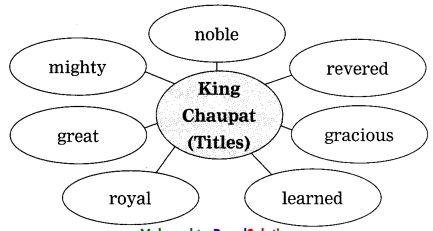
Question 2.
Find out synonyms from the extract for the following:
(Answers are directly given.)
Answer:
- delicious – delectable
- awesome – amazing
- knowledgeable – learned
- make – enliven

Question 3.
Find out the adverbs which are used along with the following verbs:
(Answers are directly given.)
Answer:
- instantly killed
- recently built
- immediately bring
- recently collapsed
Question 4.
Pick out the verbs and state their kind:
1. My friend peered through the hole.
2. The merchant was living in a house.
Answer:
1. peered – Past Tense
2. was living – Past Continuous.

Question 5.
Find out minimum four infinitives from the passage:
Answer:
Infinitives – to blame, to pour, to urge, to work.
Question 6.
Find out a suitable word from the extract and complete the following sentences:
(Answers are directly given.)
Answer:
- If you disturb the class, your teacher will give you punishment .
- Most of the women are crazy for ornaments .
- King Shibi was very generous .
- It is our duty to follow our parent’s orders .
Question 7.
Arrange the following words in the following columns as per their meanings:
Words: force, excuse, order, apologise, forgive
Answer:
| Orders | Requests |
| 1. order | (1) pardon |
| 2. command | (2) apologise |
| 3. force | (3) excuse |
| 4. shout | (4) forgive |

Question 8.
Match the following words in Column ‘A’ with their meaning in Column ‘B’ :
| ‘A’ . | ‘B’ |
| 1. yonder | (a) give the right to |
| 2. conquer | (b) over there |
| 3. recluse | (c) favouring a solitary life |
| 4. entitled | (d) capture |
Answer:
| ‘A’ . | ‘B’ |
| 1. yonder | (b) over there |
| 2. conquer | (d) capture |
| 3. recluse | (c) favouring a solitary life |
| 4. entitled | (a) give the right to |
Question 9.
Write any suitable noun from the passage for the given adjectives to make correct combination!
- generous ………………..
- wonderful ………………..
- great ………………..
- learned ………………..
Answer:
- king
- prophet
- fate
- sage.

Activities based on contextual grammar:
Question 1.
Identify the types of the following sentences:
- Give your identity.
- How boring!
- You have heard right.
- What brings you here?
Answer:
- Imperative sentence (order)
- Exclamatory sentence
- Statement (simple sentence)
- Interrogative sentence (wh-question)
Question 2.
Frame Verbal Questions:
1. There was too much of water mixed in it.
2. My friend was instantly killed.
Answer:
1. Was there too much of water mixed in it?
2. Was my friend instantly killed?

Question 3.
It is the fault of the bricklayer. He carelessly built such a weak wall.
(Combine the sentence with ‘who’)
Answer:
It is the fault of the bricklayer who carelessly built such a weak wall.
Question 4.
Pick out the subject and object in the following sentences:
1. The guards dragged the goldsmith.
2. You commanded me
3. he Hangman forced the disciple.
4. The Hangman overpowers them.
Answer:
| Subject | Object |
| 1. The guards | 1. the goldsmith |
| 2. You | 2. me/I |
| 3. The Hangman | 3. the disciple |
| 4. The Hangman | 4. they |

Question 5.
Add a tail tag to the following sentences:
(Answers are directly given.)
Answer:
- You have not carried out my orders, have you?
- Your excuse does not hold good, does it?
- This noose does not fit the goldsmith’s neck, does it?
- Take him to the gallows, will you?
Question 6.
Make the following sentences Assertive :
(Answers are directly given.)
Question a.
What a strange appeal!
Answer:
It was indeed a strange appeal.
Question b.
What a wonderful fate in my next life – a king once again!
Answer:
A king once again in my next life is really a wonderful fate.

Question 7.
Rewrite using ‘as well as’ :
1. He is a wise and learned sage from the forest.
2. The old man begged and pleaded that he should be hanged instead of the young stranger.
Answer:
1. He is a wise as well as learned sage from the forest.
2. The old man begged as well as pleaded that he should be hanged instead of the young stranger.
Personal Response:
Question 1.
Do you think this is a good land to settle in? why?
Answer:
Yes, I think the land of Andher Nagari is a good land to settle in because it is the only land where everything is sold at the same price. There will be no complications. We can settle there very well even if our income is low.
Question 2.
Can we call the thieves truly hard-working and honest?
Answer:
No, not at all. Thieves cannot be hard ; working and honest as they rob the possessions | earned by others by working hard. If they are honest, they would not do such crimes.
Question 3.
Do you think the potter is telling the truth? Why?
Answer:
The potter said when he was shaping the mouth of the pot he heard the sweet, delicate tinkling of anklets of money-lender’s daughter. I think he must be telling the truth as it might have disturbed his work and the mouth of pot became too wide.

Question 4.
Why is the daughter so confident that the king will not hang her? Does her prediction come true?
Answer:
The daughter was very much confident that the king will not hang her because she knew that she was not guilty and she also knew the king very well. Yes, her prediction came true.
Question 5.
Is the Goldsmith telling the truth? Give reasons for your answer.
Answer:
Yes, I think the Goldsmith was telling the truth. After making that ladies ornaments the Goldsmith could have received the money from her. But he did not think about the money whereas he thought about the respect and honour of the King. So he started making the Queen’s ornaments instead of that lady’s bridal ornaments.
Question 6.
What is your opinion about the king is he ? wicked, greedy, stupid or all of these? Which of his actions/words show that?
Answer:
I think the king is stupid. He believes every person of his kingdom without any proof. “Guards! Take me to the gallows and hang me at once without any delay.” This action shows that he was really stupid. Being a king he should have thought of his action.

Question 7.
Was the King willing to hang the Sage? Why?
Answer:
No, the King was not willing to hang the sage because the sage told him that the one who would be hanged on that day, in that kingdom, would become the next king. So to become the next great king of Andher Nagari, he didn’t want to hang the sage whereas he wanted himself to be hanged.
Activities Based on Language study
Do the following as instructed:
Question 1.
Complete the words by using correct letters:
- c o _ r t
- g u _ r d
- g _ e a t
- f a u _ t
Answer:
- c o u r t
- g u a r d
- g r e a t
- f a u l t.
Question 2.
Copy the following sentences correctly in your notebook:
Answer:
1. Why have you not carried out my orders?
2. What a wonderful fate in my next life a king once again!

Question 3.
Put the following words in alphabetical order:
1. forgive, excess, mercy, guilty.
2. moulding, mortar, Majesty, measure.
Answer:
1. excess, forgive, guilty, mercy.
2. Majesty, measure, mortar, moulding.
Question 4.
Punctuate the following sentences:
1. oh do not fret father the king will not hang me said daughter
2. the king said ah justice at last take him to the gallows without further delay
Answer:
1. “Oh, do not fret, father. The king will i not hang me,” said daughter.
2. The King said, “Ah! Justice at last! Take him to the gallows without further delay.”
Question 5.
Write four small words (minimum 3 letters each) using the letters in the given word:
‘explanation.’
Answer:
- explain
- nation
- plain
- plant.

Question 6.
Spot the error and rewrite the correct sentences:
1. O Noble King, you were most generous.
2. The great prophets has foretold that the one who will be hanged on this day shall become the next king and conquer many more nations.
Answer:
1. O Noble King, You are most generous.
2. The great prophets have foretold that the one who will be hanged on this day shall become the next king and conquer many more nations.
Question 7.
Write related words as shown in the
example:
(Answers are directly given.)
Answer:

Question 8.
Complete the following word-chain of adjectives. Add four words, each beginning with the last letter of the previous word:
young → ……………. → ……………. → ………….. → ………….. .
Answer:
young →
great
→
terrible
→
equal
→
lovely
Do as directed:
Question 1.
Make your own meaningful sentence by using the phrase ‘to say goodbye’.
Answer:
It is quite difficult to say goodbye to our school.

Question 2.
Add a prefix or suffix to make new
words and use any one of the root words in your own sentence: 2
1. mercy
2. complicate.
Answer:
1. mercy – merciful
2. complicate – complication.
Sentence: The bricklayer begged for mercy.
Question 3.
Add a clause to expand the sentence meaningfully:
The teacher suggested …………………..
Answer:
The teacher suggested that we should follow the rules and regulations of our country.